San Vicente del Caguan, Colombia - All that was left of Anayiber Pino’s home after the explosion were a few sheets of charred zinc that had once formed a roof.
In March, security forces landed a Black Hawk helicopter near Pino’s remote Amazon home. Her family had arrived at the farthest reaches of the jungle after having fled the conflict-ridden Cauca province seven years before.
As the family finished lunch that day, a throng of heavily armed police stormed in and accused Pino’s husband and son of crimes related to illegal deforestation and the invasion of a national park.
They gave the family three minutes to rescue what they could from the home, then detonated the shack in a blast, burning all that was left inside. Pino and her family were flown to a police station in Meta province, where her husband and son were ordered to attend a hearing before a judge. Pino and her teenage daughters were released - without a home to return to.

As a nonprofit journalism organization, we depend on your support to fund journalism covering underreported issues around the world. Donate any amount today to become a Pulitzer Center Champion and receive exclusive benefits!
“I don’t have anything,” the 53-year-old farmer told Al Jazeera, clinging to a tan backpack she had saved from her home. “They left us in the street with nothing.”
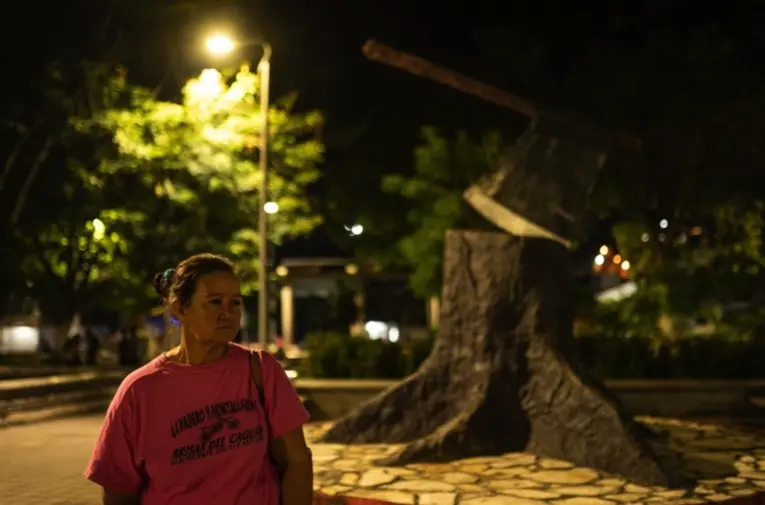
Her family had arrived in the jungles of San Vicente del Caguan with little to their name, initially sleeping under a plastic tarp as they toiled on local ranches to save up for a home. When they finally completed the zinc-panelled roof just two weeks before the military operation, Pino felt a spark of hope.
Now, after learning they had been living on protected land, Pino said she felt regret. “If we had known that we couldn’t work here, we never would have come.”
Operation Artemis
In recent years, dozens of subsistence farmers populating national parks in Colombia have been targeted by state forces under Operation Artemis, an army-led offensive aimed at combatting rampant deforestation. For the first time, Colombia is employing military forces, hardened by years of combat with rebels and organised criminals, in its efforts to protect the country’s forests and rivers.
Rolled out in 2019 by President Ivan Duque, Operation Artemis is concentrated in the Amazon provinces, where deforestation is ravaging vital, carbon-absorbing forests. Vast swaths of untouched jungles, teeming with rare wildlife species, have succumbed to raging wildfires, a common practice to open up lands to cattle ranching, illegal mining and the growing of coca plants, the main ingredient in cocaine.
“We want to show the country that in the development of our national security strategy, we will have zero tolerance for deforestation,” Duque said at the project’s launch.
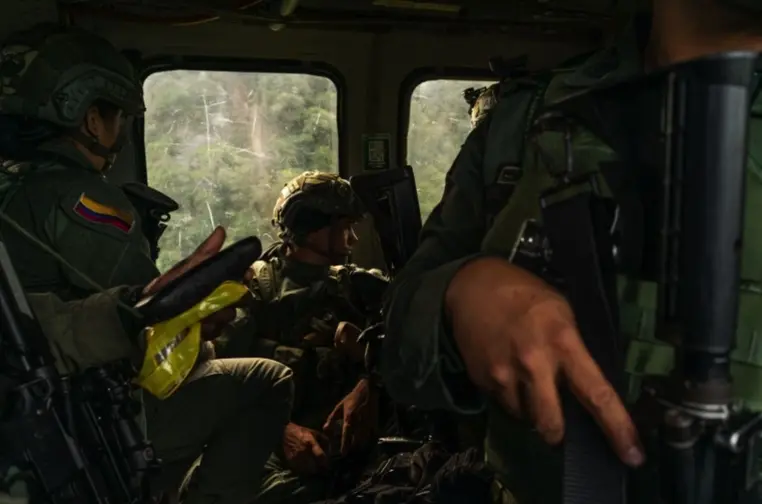
Three years later, authorities said they have made progress, with more than 100 suspects arrested and more than 21,000 hectares (51,892 acres) recovered. But deforestation rates, which Duque promised to reduce by 30 percent before the end of his term in August, have remained alarmingly high. In 2020, the country lost an area the size of Bogota, Colombia’s capital, to deforestation - an increase of 8 percent during the previous year.
Experts have attributed this to the misguided, albeit costly, efforts of Operation Artemis. It has targeted vulnerable farming families with expensive helicopter missions into the remote Amazon, instead of focusing on the kingpins who finance mass forest clearance from the comforts of their urban homes.
“[Operation Artemis] has focused too much on the lower echelons of environmental crimes,” Bram Ebus, a consultant for the International Crisis Group and expert on deforestation in Colombia, told Al Jazeera. “Sometimes, it has gone after subsistence farmers instead of the real criminals that log very large amounts of forest.”
In one operation that Al Jazeera witnessed in May, the defence ministry spent more than $12,000 on Black Hawk expenses alone for a two-hour mission that ended with the capture of one target: 54-year-old Gladis Galindo, a farmer who said she had settled in Tinigua National Park to provide food for her seven children.
Galindo said militarised police pointed guns at her and then dragged her to the helicopter, allowing her to bring a single backpack from her home. At the police station, she was accused of three environmental crimes related to residing in a national park, each carrying a maximum sentence of more than 10 years in prison. She told investigators, “I moved there because I was going hungry.”
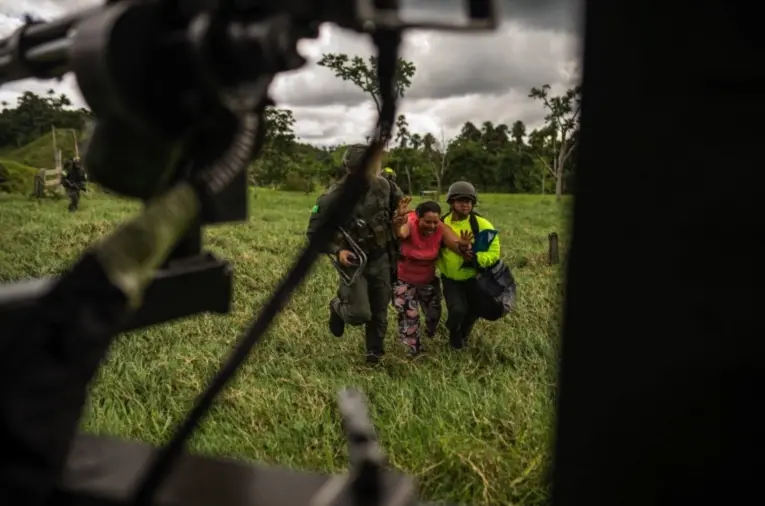
Increasing deforestation
While deforestation is nothing new in the country, rates spiked after the 2016 peace deal between the state and the Revolutionary Armed Forces of Colombia (FARC). As a rebel group, the FARC restricted activity in the Amazon, issuing conservation rules strategic to its survival. Dense, canopied forests provided the cover the rebels needed to amass troops and move them undetected.
They also built extensive roads into the jungles that have since facilitated a massive land rush into regions previously controlled by the FARC. Under the peace deal, these areas should have returned to state control and been allocated education, employment and health services. Instead, vast regions, including national parks, remain unprotected and have fallen to armed groups, settlers and wealthy elites.
The country has been thus losing the race to save its forests - and to meet international commitments. A recent Crisis Group investigation reported that Colombia was on pace to miss its 2030 zero-deforestation goal, a pledge that various densely forested countries signed on to during COP26 in order to mitigate the disastrous effects of climate change.
To environmentalists who are monitoring the crisis, such as Rodrigo Botero, an expert in forest conservation and director of the Foundation for Conservation and Sustainable Development, the outcome has been tragic.
“We’re, to put it one way, losing the Library of Alexandria of forests,” Botero told Al Jazeera.
In many Amazonian towns where deforestation is rife, statues of cattle ranchers and axes are displayed prominently in public parks, paying homage to their settler origins. After failed attempts at agrarian reforms, state programmes in the 1950s lured thousands of poor and displaced Colombians to the Amazon with promises of land titles, ushering in a tidal wave of colonisation.
As towns were established, new settlers expanded the frontier further into the jungle. By the time Pino’s family drove down a winding, unpaved road in the southern Caqueta province in 2015, long stretches of forest had been cleared decades earlier. Instead of rainforest, rolling grass pastures dotted with cows extended on either side of the road into the horizon.
La Esperanza
Pino’s family didn’t travel alone. A racially mixed household of white and Indigenous Nasa heritage, they had followed Reinaldo Quebrada, a Nasa leader, to form an Indigenous reservation. For Pino’s family, it was a chance to get away from the violence in Cauca, today the deadliest province for social leaders in Colombia, and have a chance to work the land on their own terms.
Jose Luis Mestizo, Pino’s husband, toiled his entire career, harvesting large plantations of coffee, sugarcane, plantain and yucca for landowners. But after a lifetime of work, he had little to show for his efforts.
“We heard of lands far away that had no owner and were farmable,” Pino said. “And at that time, there were lots of people in need of work.” Other families had been violently removed from their lands, facing death threats or being killed.
Along with another two dozen families, they located east of San Vicente del Caguan, today the municipality with the highest deforestation rate in the country, where jungles remained pristine. They named their tiny community La Esperanza, meaning “hope”.
In 2015, each family was allotted 100 hectares (247 acres) of land, a standard plot size in the Amazon, where the soil is acidic and less arable. Two years later, Quebrada petitioned the National Land Agency for a 200,000-hectare (494,000-acre) reservation, but he never received a reply.
And by 2018, it was too late. Then-President Juan Manuel Santos appeared on television news, announcing that Chiribiquete National Park, the country’s largest protected area, would only get bigger, absorbing nearby communities such as La Esperanza.
The following year, when 23,000 Operation Artemis troops were assigned the protection of national parks, the community of La Esperanza became a legitimate target.
According to data from the Attorney General’s Office, which investigates criminal deforestation, almost 43 percent of arrests have been made in Chiribiquete, a site of rich biodiversity with thick, humid forests that are critical to Duque’s pledge to cut greenhouse-gas emissions by more than 50 percent by 2030.
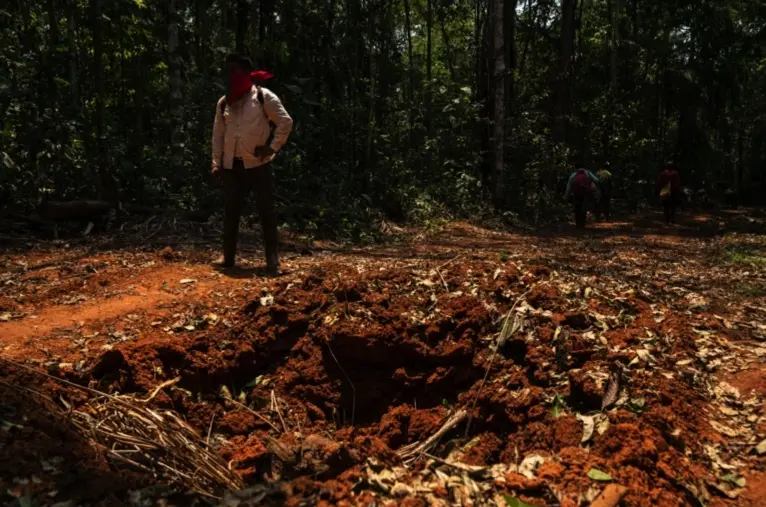
Such forests are essential for their role in decelerating climate change, acting as carbon sinks that absorb greenhouse gases. Chiribiquete alone is estimated to store 323 million tonnes of carbon, and as deforestation rapidly closes in on the park, international pressure is building for Colombia to take stronger actions to save the Amazon.
But experts have said a militarised response does little to address the deep-rooted social problems underpinning the crisis.
“They want to show [results] when it comes to fulfilling their commitments to fighting against global warming and stopping deforestation,” Jhenifer Mojica, a rural development researcher and founder of the non-profit Prodeter, told Al Jazeera. “But ultimately, they don’t care if the people they arrest stop deforestation.”
Vulnerable communities
According to the Attorney General’s Office, almost all of the more than 100 suspects prosecuted in Operation Artemis were captured on protected lands, lending support to the claim that it focuses on vulnerable, subsistence-farming families in remote areas.
Farmers are at the very bottom of the deforestation chain. Clearing one hectare (2.47 acres) of primary forest can cost up to one million pesos ($245), according to the Colombian think-tank FIP - a price out of reach for many farmers. Instead, grand-scale deforestation is fuelled by land-grabbing and speculation, financed by people with the capital to deforest many hectares of land, experts have said.
And yet, arrests such as that of Pino’s family aren’t the exception, but the norm. In some operations, entire families, including children, are plucked from their homes, and then prohibited from returning to the protected areas where they had been living. Some do anyway, because they have nowhere else to turn. Operations also target community-built roads and bridges that authorities said fuel deforestation, but improve local living conditions.
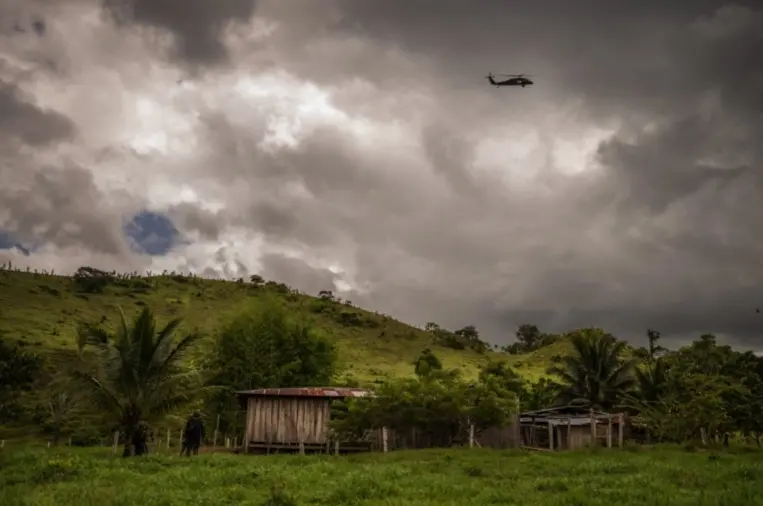
In response to such criticism, Defence Minister Diego Molano told Al Jazeera that Operation Artemis is still new and adapting. The first hurdle was designing missions from scratch, training teams on environmental protection, and bringing different agencies together to work. The second was identifying targets. Detaining farmers is a necessary part of the operation and has led to new information and high-impact arrests, he added.
“They collaborate with the justice system, and through investigations, we reach the intellectual authors,” Molano said.
Asked to name major deforesters who had been captured, Molano singled out two men known by their aliases: “El Gurre” and “El Rey”. El Gurre, whose real name is Reinel Gaitan Tangarife, is accused of running an illegal mining ring and illegally seizing 4,500 hectares (11,120 acres) of jungle in an Indigenous Nukak reservation.
Police sources told Al Jazeera that he was arrested within blocks of the local police station in Granada, Meta, from where some of the Operation Artemis air operations are launched. Seven police officers were reportedly detained alongside him and charged with receiving bribes from Tangarife.

The news fuelled criticism that resources could better be used investigating supply chains and money trails to track down the financiers of deforestation. But such investigations are often quickly derailed. “It’s not so much a case of incapability or lack of knowledge, but an issue of corruption that prevents Operation Artemis from being effective,” Ebus said.
El Rey, the other suspect named by Molano, is the alleged alias of Reinaldo Quebrada. In April, he was arrested a second time, after being detained last year for residing within Chiribiquete. The Attorney General’s Office accused him of being “one of the worst sponsors of deforestation in Chiribiquete National Park”. Authorities charged him with plotting to illegally seize 200,000 hectares (494,000 acres) of forest, and selling one-hectare plots for 200,000 pesos (less than $50) each.
Police sources told Al Jazeera that through wiretapped telephone conversations, they gathered enough evidence to accuse Quebrada of promoting and financing deforestation, new crimes punishable by up to 15 years in prison. Quebrada’s lawyer, Sebastian Azuero, has denied the allegations, saying authorities pinned the deforestation of 40 hectares on his client because of his leadership position within La Esperanza. “They still haven’t shown any evidence to accredit this [deforestation] claim,” Azuero told Al Jazeera.
Opposition growing
On March 5, a boom echoed throughout El Triunfo, a farming community next to La Esperanza. Police had just detonated a home.
Then, another boom was heard: This time, it was Pino’s home. Shortly after the blast, a burning pile of zinc panels remained where the house once stood. A wet pair of jeans and sweatpants hung from a wire near the wreckage, as a few metal pots balanced on a teetering wooden board. But the family was nowhere to be found.
When they remained missing the next day, neighbours confronted a group of soldiers. A mobile phone video, released by Senator Ivan Cepeda, showed farmers and soldiers engaged in a heated argument that crescendos before a barrage of shots is heard.
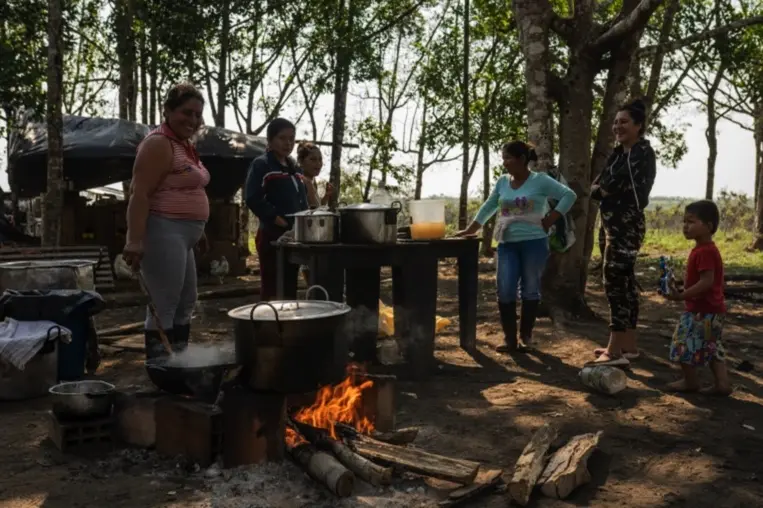
Julian Andres Suarez, a farmer, died after being shot in the chest, while three others were reportedly wounded. In the video, a woman yelled at a soldier as he photographed Suarez’s body lying in the dirt, “We’re just dead dogs to you all.” The incident is under investigation by the Attorney General’s Office.
Farmers subsequently detained a soldier, destroyed his weapons and gave him 15 lashes, in accordance with their Indigenous customs. Public protests against the state are becoming increasingly common in this part of Colombia, highlighting some of the challenges of removing communities who feel rooted to these lands.
Experts have said the government is putting too much emphasis on prosecuting farmers, rather than addressing the core social issues underlying the crisis, such as displacement and land inequality. At the same time, the government is missing an opportunity for dialogue.
“Instead of criminalising these people in national parks and sporadically going after them, the government could turn them into an ally to protect these national parks and work on sustainable economies that are [compatible] with nature,” Ebus said.
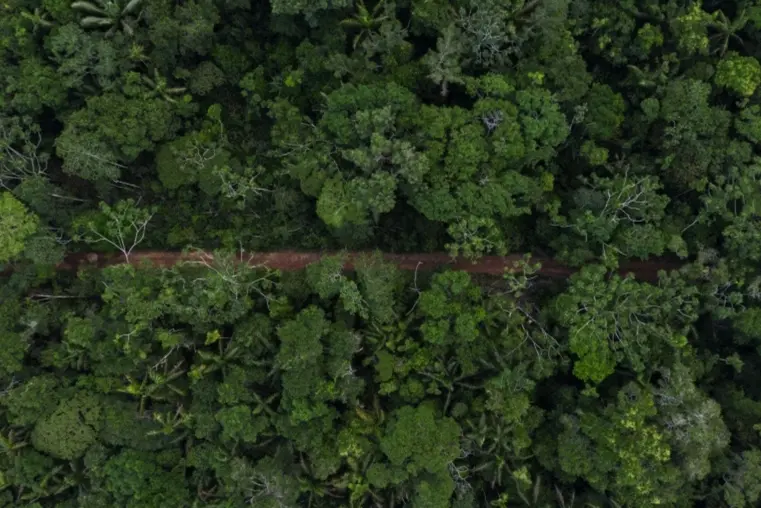
To Pino, whose life ambition was to own land and pass it down to her children, Operation Artemis has been a failure, creating new problems without solving those that already existed. “What do they do with poor farmers?” she asked. “They criminalise them, force them out of their lands and into a life of delinquency.”
She is now concerned for the future, with the family’s home gone and its breadwinners in jail. She has approached state institutions for help, she said, but all of them have turned her away.
“I don’t know what to do,” she said. “I don’t have anywhere to go.”





